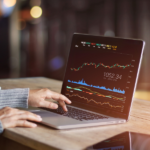What is a forex and how does it work? The foreign exchange market is a global electronic currency trading network.
Previously limited to governments and financial institutions, individuals can now buy and sell foreign currency currencies directly.
In the foreign exchange market, a profit or loss is caused by the difference in the price of a currency pair that traders buy and sell.
Currency traders do not trade in cash.
Brokers usually flip their positions at the end of each day.
Table of Contents:
What is Forex?
Forex (or fx) is foreign currency, the sum of foreign currency and foreign currency.
Foreign exchange refers to the global electronic marketplace for trading international currencies and currency derivatives. It does not have a central physical location. However, the foreign exchange market is the most traded and liquid market in the world, with trillions of dollars changing hands every day. Most transactions are conducted through banks, brokers and financial institutions.
The foreign exchange market is open 24 hours a day, five days a week, excluding public holidays. On holidays, the foreign exchange market is open when many stock markets are closed, although trading volumes may be lower.
Understanding changes
The existence of foreign currency allows you to convert a large amount of one currency into the equivalent of another currency at the current exchange rate of the market.
Some of these transactions are due to the business needs of financial institutions, companies or individuals to convert one currency into another. For example, an American company may exchange US dollars for Japanese yen to pay for goods ordered in Japan that are paid for in Japanese yen.
The existence of many foreign exchange transactions is to adapt to speculation in the direction of the value of the currency. Traders profit from price changes of specific commodities.
Forex Pairs and Quotes
Traded currencies are listed in pairs, such as USD/CAD, EUR/USD or USD/JPY. These represent the US dollar (USD) for the Canadian dollar (CAD), the euro (EUR) for the US dollar and the US dollar for the Japanese yen (JPY).
Each pair will also have an associated price, such as 1.2569. If the price is related to the USD/Canadian dollar pair, it costs 1.2569 Canadian dollars to buy one US dollar. If the price rises to 1.3336, it now costs 1.3336 Canadian dollars to buy one dollar. The value of the US dollar has risen (the Canadian dollar has fallen) because it now costs more Canadian dollars to buy one US dollar.
How big is the foreign exchange market?
There are several reasons for the uniqueness of the foreign exchange market, mainly its size. The trading volume in this market is large. Taking as an example the volume of transactions on the foreign exchange market in 2019, the data show that the average daily volume of transactions in the foreign exchange market is 6.6 trillion US dollars for the Bank for International Settlements. This exceeds the global stock trading volume by about 25 times.
The largest forex markets are located in major global financial centers, including London, New York, Singapore, Tokyo, Frankfurt, Hong Kong and Sydney.
How does forex trading work?
This foreign exchange market is open 24 hours a day, five days a week, in major financial centers around the world. This means that you can buy and sell currencies at almost any time.
In the past, foreign exchange transactions were mainly limited to governments, large corporations, and bank hedge funds. Now, anyone can use foreign currency transactions. Many investment firms, banks and retail brokers allow people to open accounts and trade currencies;
When you trade in the foreign exchange market, you are buying and selling the currency of a particular country instead of another currency. But there is no physical exchange from one side to the other as in a foreign currency kiosk.
In the world of electronic marketplaces, traders usually hold positions in a particular currency, hoping that the currency they buy will increase and strengthen (if they sell, they will weaken) to make a profit.
One currency is always exchanged against another currency. If you sell one currency, you are buying another currency; if you buy one currency, you are selling another currency. Profit is obtained based on the difference between transaction prices.
How foreign exchange is different from other markets
There are some important differences between the functioning of the foreign exchange market and other markets such as the US stock market.
Fewer rules
This means that investors are not subject to strict standards or supervision such as stocks, futures or futures; options; markets. No, the clearing house and there is no central agency that supervises the entire foreign exchange market. You can short sell at any time because you have never been short in the foreign exchange market; if you sell one currency, you are buying another currency.
Commissions and commissions
Since the market is not regulated, commissions and commissions vary greatly between brokers. Most foreign exchange brokers make money by raising prices to spread currency pairs. Others make money by charging fees, which fluctuate based on the number of currencies traded. Some brokers use both.
Full access
There are no boundaries between when you can trade it and when you can’t exchange it. Since the fx market is open 24 hours a day, you can trade at any time of the day. The exceptions are weekends, or no global financial center is available due to the holidays.
influenza
The foreign exchange market allows leverage. In the United States, the ratio is as high as 50:1 and even higher in some parts of the world. This means that a trader can open a $1,000 account and buy or sell up to $50,000 in currency. The lever is a double-edged sword. It magnifies profits and losses.
What is an example of forex trading?
Suppose the trader believes that the euro will appreciate against the dollar. Another point of view is that the dollar will fall against the euro.
The trader buys euros at 1.2500 euros / dollars and buys currency worth 5,000 US dollars. Later that day, the price rose to $1.2550. The trader rose by $25 (5000 * 0.0050). If the price drops to 1.2430, the trader will lose $35 (5000 * 0.0070).
Currency prices are constantly changing, so traders can decide to hold positions overnight. The broker reverses the position, generating credits or debts based on the interest rate differential between the Eurozone and the United States. If the interest rate in the Eurozone is 4% and the interest rate in the United States is 3%, then in this example, the trader owns a currency with a higher interest rate. Therefore, during the rollover, the merchant should receive a small credit card. If the interest rate in euros is lower than the interest rate in US dollars, the trader will charge during the rollover payment.
Rollover delivery can affect trading decisions, mainly if you can keep the transaction for a long time. Large differences in interest rates can lead to many credits or charges every day, significantly increasing or eroding trade profits (or increasing or decreasing losses).
Most brokers provide leverage. Many US brokers have leverage ratios of up to 50:1. Suppose our trader uses a leverage ratio of 10:1 in trading. If a leverage ratio of 10:1 is used, the trader does not need to have an account with USD 5,000, even if the currency is worth USD 5,000. It only needs 500 dollars.
In this example, considering that the trader only needs 500 US dollars or 250 US dollars of trading capital (if you use more leverage, or even less), you can quickly make a profit of 25 US dollars. This is the power of leverage. On the other hand, traders can lose funds just as quickly.
Conclusion
When trading in the foreign exchange market, you buy the currency of a certain country while selling the currency of another country. But there is no physical currency exchange between one hand and another. In today’s world of electronic marketplaces, currency trading is as easy as a click.
Traders usually hold positions in a specific currency, hoping that the currency they buy will have some upward changes and strength (if they sell, there will be a weakness) to make a profit.


